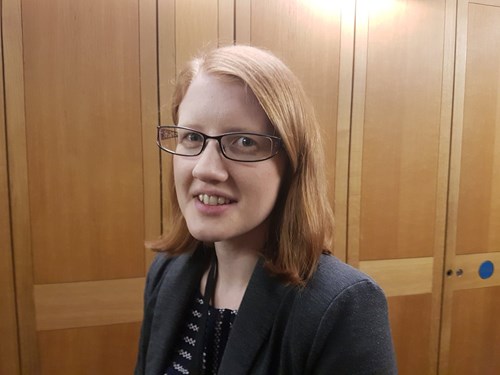Q and A with campaigning police safety MP Holly Lynch
4 November 2017

The Protect the Protectors Bill passed its second reading in Parliament in October, aiming to increase the sentences for those convicted of assaulting emergency service workers.
Holly Lynch, Labour MP for Halifax, has been instrumental in lobbying MPs from all parties to support the Bill.
She got involved after going out on patrol with a local West Yorkshire officer and ended up calling 999 for back up after they were surrounded by a group of individuals after pulling over a car.
Here, Holly explains about how the Protect the Protectors Bill could finally end up becoming law.
Q. Can you update us about the Protect the Protectors Bill in Parliament?
A. There have been ongoing negotiations between the Labour Party and cross-party MPs, and the Government. It’s been a bit backwards and forwards whilst we try and negotiate exactly how we can make this Bill as effective as possible.
It is about protection for emergency service workers so that the toughest possible deterrents are in place to ideally prevent anybody from assaulting an emergency service worker in the first place.
But in addition to that, in relation to spitting, somebody would now have to provide a good sample if they spit at an emergency service worker, to determine whether that person would need to start taking anti-viral treatments. And it will just give emergency service workers peace of mind about whether they’re in danger of having contracted a communicable disease or not. So this is a really positive step forward for all of our 999 responders.
Q. What sort of custodial deterrents are you looking for as part of this Bill?
A. Really quite significant. What we know is the police assault charge just refers exclusively to police officers, and actually it just wasn’t being used enough by the judiciary. It also meant that it had a maximum sentence of six months. This will now be extended by 12 months and it’ll also be triable either way, which is great. It opens up a whole raft of much longer sentences, and we will encourage the judiciary to use those where it sends the strongest possible message that it’s absolutely unacceptable to assault an emergency service worker.
Q. Why is it so important to Protect the Protectors?
A. Having been out and spent a lot of time with our frontline emergency services and seen the work that they do, I don’t think anybody has any doubts about how important their role is. I’ve been increasingly concerned about how the cuts to emergency frontline services mean that they’re increasingly out on their own, and there is an increased vulnerability that goes with that. We want to make sure that they’ve got all the protections that they need to do that really important work.
We’ve seen a number of incidents recently that they really are our frontline, but they deserve our support. And to assault our emergency service workers is to show complete disregard for law and order, and for laws that have been agreed by society itself. It’s unacceptable and I think this change in law now really sends that message loud and clear.
Q. What will the timescale be in terms of this becoming law?
A. That’s a really good question. It could still be a number of months, just because this means that it passes its second reading in the House of Commons. It will still have to go through the committee stage, which is line-by-line scrutiny.
We will still have to work quite hard to make sure there are no additions or watering down or taking things out of it that are important, as we go through that committee stage, which will be really key. It will then come back to the House of Commons for a further reading. It will then go to the House of Lords for a second reading, committee stage and third reading, before it comes back for final royal assent.
So it could still take a number of months before we see it implemented. But the second reading of the House of Commons is always the biggest hurdle, and so it’s great news that we now expect that there will be no trouble there whatsoever.
Q. This has been very personal to you, as your father was a police officer. How are you feeling right now about the state of play?
A. I don’t want to be celebrating just too quickly. As I said, there are a number of months to go yet before this is really enshrined in law, and get protections out on the streets for emergency service workers. However, right now, we’ve come an awful long way in quite a short period of time. It is something that’s important.
We started this campaign after I had been out and had really quite an eye opening, potentially dangerous experience, with a police officer on the streets of my constituency. My mum was a nurse, my dad was a police officer, so I’m feeling pretty delighted right now that things are going as well as they possibly can be.
It’s looking like the Government is working with us, and I hope now it’s only a matter of time before these deterrents are out there, on the streets, protecting people. Yeah, absolutely delighted.














